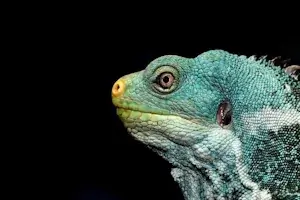The Care of Iguanas: A Guide for Reptile Enthusiasts
Iguanas are among the most fascinating reptiles to keep as pets. With their impressive appearance and unique behavior, they captivate many reptile lovers. However, keeping iguanas is demanding and requires expertise, patience, and careful planning. In this blog post, you’ll learn everything you need to know about the proper care of iguanas – from terrarium setup to nutrition and general care.
1. Why Keep Iguanas?
Iguanas are extraordinary reptiles that stand out for the following qualities:
- Majestic Appearance: With their size and striking colors, iguanas are a real eye-catcher.
- Interesting Behavior: They display a wide range of activities and interactions.
- Challenge: Their demanding care requires commitment, making it a rewarding hobby.
2. Choosing the Right Iguana Species
There are many species of iguanas that differ in size, behavior, and natural habitat. Some of the most popular species for terrarium keeping include:
- Green Iguana (Iguana iguana)
- Size: Up to 2 meters (including tail)
- Origin: Central and South America
- Habitat: Tropical forests
- Special Features: Commonly kept in captivity, needs a lot of space and intensive care.
- Fiji Banded Iguana (Brachylophus spp.)
- Size: 60–90 cm
- Origin: Fiji Islands
- Habitat: Tropical rainforests
- Special Features: Colorful, relatively small, rarely available.
- Desert Iguana (Dipsosaurus dorsalis)
- Size: 25–40 cm
- Origin: Southwestern USA and Mexico
- Habitat: Deserts and semi-deserts
- Special Features: Compact, easier to care for, suitable for experienced keepers.
3. The Ideal Terrarium for Iguanas
Iguanas need a spacious and well-equipped terrarium that simulates their natural habitat.
- Terrarium Size
- Adult Green Iguanas require a terrarium at least 200 x 200 x 300 cm.
- Smaller species, like Desert Iguanas, need at least 120 x 60 x 120 cm.
- Terrarium Setup
- Climbing branches and platforms: Iguanas are excellent climbers and need stable branches and elevated areas.
- Hiding spots: Large caves or plants offer retreat options.
- Water area: A large pool for bathing helps with humidity regulation.
- Substrate: Earth, coconut fibers, or a sand-earth mixture depending on the species.
- Climate
- Temperature: Daytime 28–35°C, basking areas up to 45°C, nighttime 20–25°C.
- Humidity: Tropical species need 70–90%, Desert Iguanas 30–50%.
- Lighting: High-quality UVB lamps are essential to support calcium metabolism and prevent rickets.
4. Iguana Diet
Most iguanas are herbivores, with a few exceptions like the Desert Iguana, which occasionally consumes animal food.
- Plant-Based Diet
- Leaves and herbs: Dandelion, clover, Golliwoog, chicory.
- Vegetables: Zucchini, carrots, bell peppers, pumpkin.
- Fruits: In small quantities, such as apples, bananas, berries.
- Animal Food
- Desert Iguanas occasionally eat insects like crickets or mealworms.
- Feeding Frequency
- Young Iguanas: Daily
- Adults: Every 1–2 days
- Supplements
- Regular calcium and vitamin supplements should be given to prevent deficiencies.
5. Care and Health Maintenance
- Regular Cleaning
- Remove feces and food leftovers daily.
- Disinfect the terrarium monthly.
- Shedding
- Iguanas shed regularly. Support this process with high humidity and rough surfaces.
- Health Symptoms to Watch For
- Healthy Iguanas: Clear eyes, smooth skin, active behavior.
- Warning Signs: Lethargy, loss of appetite, breathing problems, or swollen limbs.
- Regular Vet Visits
- A reptile-specialized vet should check the iguana at least once a year.
6. Behavior and Interaction with Iguanas
- Socialization
- Iguanas can learn to tolerate their owners if they interact regularly.
- Handling Tips
- Approach slowly and calmly, never grab from above.
- Lift the iguana gently and support its body well.
- Avoid stressful situations like loud noises or frequent handling.
7. Legal Requirements
- Species Protection and Proof of Origin
- Iguanas are often protected species (e.g., CITES). Proof of origin is required in many countries.
- Care Requirements
- Some regions have minimum requirements for terrarium size and care. Make sure to research local laws before acquiring one.
8. Common Mistakes in Iguana Care
- Insufficient Space
- A too-small terrarium can lead to behavioral problems and stress.
- Incorrect Climate
- Improper temperatures or humidity levels can cause illness.
- Unbalanced Diet
- Incorrect food mixtures can lead to deficiencies or digestive issues.
- Too Much Handling
- Iguanas are not pets for cuddling. Excessive contact can cause stress.
9. Conclusion: Unique Reptiles with Special Needs
Iguanas are impressive creatures, but they have high care demands. With a properly set up terrarium, a balanced diet, and good maintenance, you can provide your iguana with a healthy and happy life. Before deciding to keep one, make sure to understand their specific needs and requirements.

